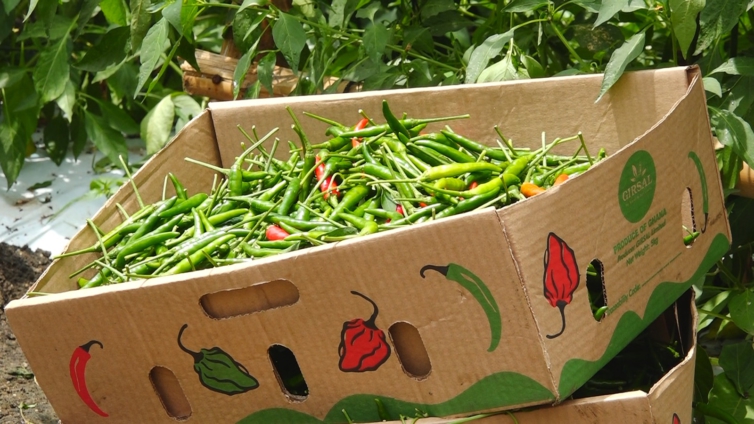Pepper is used in preparing most Ghanaian foods, used as a side dish or sauce and even used for snacks like egg with pepper affectionately called “kosea ne meko”.
Due to the high consumption of chili pepper, World Data Atlas shows that Ghana produces an average of 3,700 tonnes of pepper annually. The mode of production over the years have been traditional farming but the past eight years have seen a gradual shift to the net house technology.
The Director of Agribusiness at Ghana Incentive-Based Risk-Sharing System for Agricultural Lending (GIRSAL), Samuel Yeboah explained the production cycle of chili needs time and attention to nurture.
“We started this about four months ago. We did the nursery for about six weeks and after which we transplanted on 17th May. Harvesting has started on schedule after exactly 10 weeks. We expect to make about $25,000 from this production alone which is 0.4 hectare or an acre of land at the end of the production cycle. It will take one year to complete the cycle,” he said.

In 2014, the European Union imposed a ban on vegetable exports to its market due to non-compliance with sanitary and phyto-sanitary requirements. The EU ban was removed in November 2017, following an improvement in the requirements but vegetable exports, especially chilies have not recovered to the pre-EU ban levels. In a bid to revive the sector, GIRSAL started a commercial trial of production of chili in net houses.
The Chief Operating Officer at GIRSAL, Takyi Sraha said “we want to intervene in this sector to demonstrate to agribusinesses and financial institutions that it is possible to produce pepper in net houses using this low technology for export”.
It is estimated that Ghana lost $30 million during the period the ban was imposed.
The President of the Ghana Vegetable Producers and Exporters Association, Dr. Felix Kamassah called for more investments in the net house technology to prevent a recurrence of a ban.
“This system is very expensive and the youth cannot afford. Government has been trying to address youth unemployment by luring them into agriculture. I think if government invests in this technology, study the mode of production and develops a blueprint to guide anyone, they can circulate it. This will give financial institutions assurance of proper business plans developed by players along the value chain and easily hand out loans,” he emphasised.
Juliana Asante-Dartey, Executive Director of Agri-Impact, an agribusiness consultancy firm managing the technology, highlighted the importance of the net house technology.
“Using the net house technology you get to control some of the parameters like regulating the quantity of water especially when it rains. The size of the pores of the net breaks the impact of the rain. We also use irrigation hence we continue production even in dry seasons. We get to control the application of fertilisers and agro-inputs because we use the drip technology. Again, we follow protocols like spraying at the right time, the right quantity, using the right applicator for the spraying among others,” she highlighted.
Prospects in chili production are huge hence it will be beneficial to the economy if Ghana could quickly recover from the impact of the ban and increase export.
Latest Stories
-
Ebenezer Ahumah Djietror appointed as new Clerk to Parliament
10 minutes -
Actress Benyiwaa of ‘Efiewura’ TV series dead
39 minutes -
Ashanti Regional Chief Imam dies at age 74
1 hour -
Africa Arts Network calls for tax reform to save Ghana’s theatre industry
1 hour -
SSTN Ghana Chapter reaffirms commitment to economic growth under new leadership
1 hour -
Inlaks strengthens leadership team with key appointments to drive growth across sub-Saharan Africa
2 hours -
Green Financing: What Ghana’s Eco-startups need to know
3 hours -
CHAN Qualifiers: Amoah confident of beating Nigeria
3 hours -
Governments deprioritising health spending – WHO
3 hours -
Lordina Foundation brings Christmas joy to orphans
3 hours -
Yvonne Chaka Chaka to headline ‘The African Festival’ this December
3 hours -
Nigerian man promised pardon after 10 years on death row for stealing hens
3 hours -
Patrick Atangana Fouda: A Hero in the fight against HIV passes away
3 hours -
MGA Foundation deepens support for Potter’s Village
3 hours -
Galamsey: One dead, 3 injured as pit collapses at Nkonteng
4 hours

